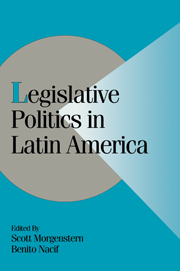Book contents
- Frontmatter
- Contents
- Tables and Figures
- Contributors
- Preface and Acknowledgments
- Party Names and Other Acronyms and Abbreviations
- 1 TOWARDS A MODEL OF LATIN AMERICAN LEGISLATURES
- Part I Executive–Legislative Relations
- Part II Political Parties and Legislative Structure
- 6 EXPLAINING THE HIGH LEVEL OF PARTY DISCIPLINE IN THE ARGENTINE CONGRESS
- 7 PARTY DISCIPLINE IN THE CHAMBER OF DEPUTIES
- 8 PARTIES, COALITIONS, AND THE CHILEAN CONGRESS IN THE 1990s
- 9 UNDERSTANDING PARTY DISCIPLINE IN THE MEXICAN CHAMBER OF DEPUTIES: THE CENTRALIZED PARTY MODEL
- Part III Legislatures and the Policy Process
- Part IV Conclusions
- References
- Author Index
- General Index
9 - UNDERSTANDING PARTY DISCIPLINE IN THE MEXICAN CHAMBER OF DEPUTIES: THE CENTRALIZED PARTY MODEL
Published online by Cambridge University Press: 14 January 2010
- Frontmatter
- Contents
- Tables and Figures
- Contributors
- Preface and Acknowledgments
- Party Names and Other Acronyms and Abbreviations
- 1 TOWARDS A MODEL OF LATIN AMERICAN LEGISLATURES
- Part I Executive–Legislative Relations
- Part II Political Parties and Legislative Structure
- 6 EXPLAINING THE HIGH LEVEL OF PARTY DISCIPLINE IN THE ARGENTINE CONGRESS
- 7 PARTY DISCIPLINE IN THE CHAMBER OF DEPUTIES
- 8 PARTIES, COALITIONS, AND THE CHILEAN CONGRESS IN THE 1990s
- 9 UNDERSTANDING PARTY DISCIPLINE IN THE MEXICAN CHAMBER OF DEPUTIES: THE CENTRALIZED PARTY MODEL
- Part III Legislatures and the Policy Process
- Part IV Conclusions
- References
- Author Index
- General Index
Summary
Throughout the long period of single-party dominance over the Mexican political system, the study of the legislature was exhausted by the study of the congressional delegations of the PRI (Institutional Revolutionary Party). Founded in 1929, the PRI maintained a long-lasting control of access to the vast majority of elected offices, which allowed it to monopolize the constitutional powers formally residing in the two houses of the Congress – the Chamber of Deputies and the Senate. The congressional opposition played a marginal role in the decision-making process, questioning presidential initiatives in floor debates but without any significant impact on policy outcomes.
Political analysts have identified two institutional aspects of the PRI congressional delegations that have had an enormous significance in terms of the operation of the Mexican political system as a whole. First, the real source of party leadership has not resided within the Congress itself but in the Presidency of the Republic. Second, PRI congressional delegations have regularly shown a high degree of party unity. According to Weldon (1997), as long as the PRI has had the majority in the Congress, presidential leadership and party discipline have provided sufficient conditions for executive dominance over the policy-making process. Casar (1999) argues that one of the distinguishing features of Mexican presiden cialismo was that the enormous authority of the chief executive did not spring from his constitutional prerogatives but from his ability to mobilize at will the disciplined support of PRI congressional majorities. Unlike other Latin American chief executives, Mexican presidents are not allowed by the Constitution to introduce changes in legislation without active congressional approval.
- Type
- Chapter
- Information
- Legislative Politics in Latin America , pp. 254 - 284Publisher: Cambridge University PressPrint publication year: 2002
- 28
- Cited by

